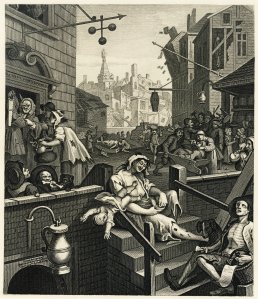In 1844, Edgar Allan Poe wrote to another three-namer, James Russell Lowell, swearing that “I am not ambitious” (his emphasis), “because I feel nothing of ambition. I really perceive the vanity about which most men merely prate—the vanity of human or temporary life” (1). This was bullshit. Like all writers who are honest with themselves, Poe wanted readers. Things never worked out so well, unfortunately.
He was a garret-dweller even when he wasn’t living in an actual garret. Poe knew more about renting pinched, grimy spaces than any college student. In large part this is because his short, unhappy life bounced from one poorly paid writing project to another: dashed-off book reviews, his improvisational brilliance saving many from mediocrity even as they vanished from public memory, like book reviews almost always do; brief essays and columns, some of which he published, in multiple venues, as his “Marginalia”; editorial gigs at journals that just kept going under; occasional interviews with loftier figures, such as Charles Dickens in Philadelphia in 1842 (2); unappreciated, shockingly original stories published in obscure magazines, and poems, most of them bad, that received even less attention. Mixed in were letters written from a financial position that was frequently desperate. Here, sick and broke in Baltimore at the age of twenty-four, he writes to his stepfather, John Allan, with whom he had fallen out:
It has now been more than two years since you have assisted me, and more than three since you have spoken to me. I feel little hope that you will pay any regard to this letter, but still I cannot refrain from making one more attempt to interest you in my behalf. If you will only consider in what a situation I am placed you will surely pity me–without friends, without any means, consequently[,] of obtaining employment, I am perishing–absolutely perishing for want of aid. And yet I am not idle–nor addicted to any vice–nor have I committed any offence against society which would render me deserving of so hard a fate. For God’s sake pity me, and save me from destruction.
Allan did not answer and died eleven months later. Poe had been cut from the will.
In the mid-nineteenth century, as the United States began molting from a slave-holding backwater into a slave-holding market empire, the nation’s publishing sector expanded quickly. Despite earning very little, Poe’s career in this world of East Coast magazines was active, even frenzied. As both writer and editor, he was a prototype of the modern American freelancer, living gig to gig, collecting bylines, trying to build an audience, rarely making much money, drinking too much, getting holes in his socks–living on the edge of capitalist respectability, in several respects. In 2015, he’d be on Twitter (probably with a morbidly funny feed, given what his stories are often like). He’d have a good blog. He’d be sending pitches to Buzzfeed and n+1 alike. Poe might crop up, pissed and grim about something, on Gawker, or maybe in the Kinja comments.
This was the “thankless field of Letters” (4), where, despite his membership, he was never at home. The “Magazine Prison-House,” as the title of one short essay calls it, left almost no time for longer literary projects. “The whole tendency of the age is Magazine-ward,” he contends in the 1846 piece “Magazine Literature in America” (5). The reading public is short on attention and tantalized by the new avalanche of written media–a complaint which may sound familiar to 2015’s general readers–and so “Quarterly Reviews,” which are more scholarly and specialized, seem “out of keeping with the rush of the age” (his emphasis). In their place, Poe wants “daily journals” and monthlies. “We now demand,” he continues, “the light artillery of the intellect; we need the curt, the condensed, the pointed, the readily diffused–in place of the verbose, the detailed, the voluminous, the inaccessible.” I kept thinking of Twitter, and checking Twitter.
Reasonably aware of his own assumptions, Poe also underlines the potential cognitive and culture damage caused by endless “light artillery:
On the other hand, the lightness of the artillery should not degenerate into popgunnery–by which term we may designate the character of the greater portion of the newspaper press–their sole legitimate object being the discussion of ephemeral matters in an ephemeral manner. Whatever talent may be brought to bear upon our daily journals . . . still the imperative necessity of catching, currente calamo [“with a running pen”], each topic as it flits before the eye of the public, must of course materially narrow the limits of their power.
Half a century earlier, in his famed preface to the Lyrical Ballads, Wordsworth gripes about the same disease of inattention, impatience, and overstimulation, which he calls “a craving for extraordinary incident[.]”
Wordsworth, though, avoided the hodge-podge world of journalists, preferring to write lyrics, some of them quite good, in his cottage. Poe was neck-deep in it. Like many of his contemporaries–like many of us–he was both spooked and thrilled by the modern flood of content, and bled dry by its enabling economic model. The freelancing, permanent-rental economy is not entirely new.
Notes
1) Cited in Jerome McGann, Alien Angel: The Poet Edgar Allan Poe (Harvard, 2014), p. 53.
2) J. Gerald Kennedy, Introduction to The Portable Edgar Allan Poe, ed. J. Gerald Kennedy (Penguin, 2006), xxi.
3) Ibid., p. 455.
4) Poe, “Some Secrets of the Magazine Prison-House” (1845), cited in Ibid., p. 579.
5) Cited in Ibid, p. 599.


